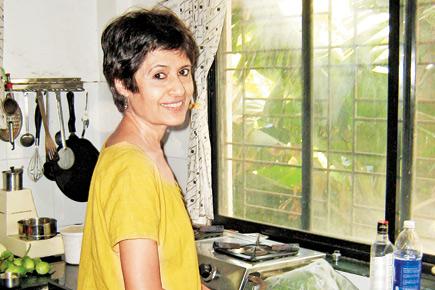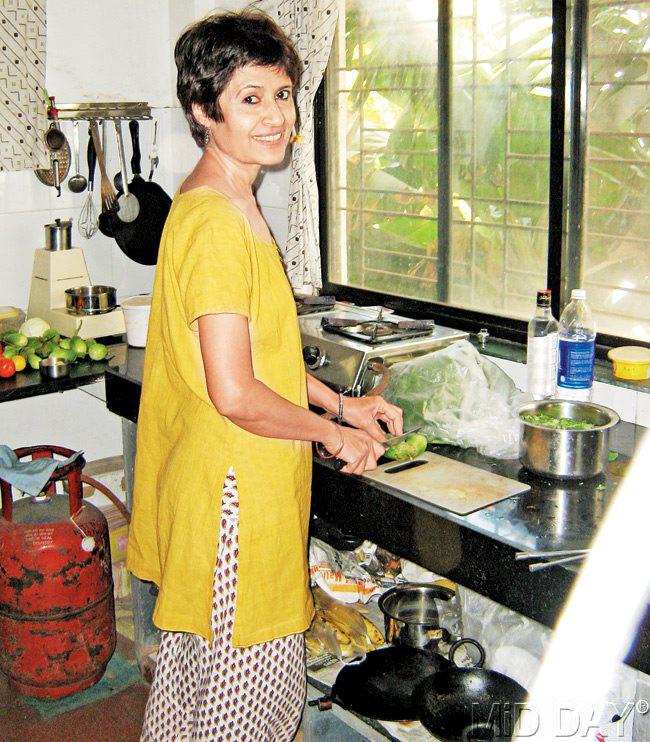Dr Kavery Nambisan’s seventh novel is based in a village-turned-town where the water runs a toxic black and every child’s head is white. The author tells Kareena Gianani how her medical career, a childhood spent in Coorg and social injustice compel her fiction to be true to rural India’s reality

Dr Kavery Nambisanu00c3u00a2u00c2u0080u00c2u0099s fiction largely deals with her medical career in rural India.
Dr Kavery Nambisan’s new novel, A Town Like Ours, begins with Rajakumari, a retired whore, narrating stories of a fictional village-turned-town, Pingakshipura. This she does from her small room which has a “kerchief-sized” window. Throughout the book, her tone is tender when she describes extraordinary circumstances of ordinary folk, but tart when she speaks of the factory in the town which changes the landscape — and their lives — forever.

Dr Kavery Nambisan’s fiction largely deals with her medical career in rural India. PIC COURTESY/Vijay Nambisan
Nambisan says she began writing her seventh novel when a childhood memory came flooding back. “Most of my books come from my childhood — the simplicity in going to school barefoot, the people I knew while growing up in Coorg, and later in Delhi. Rajakumari’s character is based on a woman I saw in a room near a temple at Gole Market, Delhi. She was frightening. Her face looked puffy in the light of the lone, dim bulb in the room. She always smoked a hookah, and had a gruff voice,” remembers Nambisan, who lives in Coorg and works at the hospital, Rural India Health Project, since 2006.
Apart from drawing characters from her childhood and dreams (“It sounds corny, but I cannot ignore my dramatic, crazy dreams!”), Nambisan turns to issues that preoccupy her. Going by her current novel, it is the development-versus-environment conundrum she is mulling over. “As a surgeon who works in rural India, I see it playing out every day — the price villages and small towns pay when a shiny new factory or development project take over their space.
They seem to provide the small town with everything it thought it needed, but at a price too high,” feels Nambisan.
Nambisan’s writing career began in 1986 with children’s writing. She says she found a distinct voice soon after and began writing for adults, too. Her book, The Story that Must Not Be Told, was shortlisted for the DSC Prize for South Asian Literature in 2012, as well as the Man Asian Literary Prize in 2008.
It would be logical to assume that her medical career influences her writing, but has her writing affected her as a doctor, too? Nambisan chuckles and admits that she is a disciplined doctor but hopelessly scatterbrained otherwise. “My absent-mindedness extends to my writing, too. I have to write many drafts to get things right. However, I do think that writing — and all the reading which helps me write better — has made me more sensitive to the people I heal. Writing makes you hungry for life stories and open to alternative realities. I am glad it seeps into my work when I meet my patients,” says Nambisan.
The author admits that she finds fiction more liberating than writing, say, a medical non-fiction book. “However, someday, I would like to try my hand at one, just to provide an honest account of the realities of the medical profession. Many years ago, I decided to leave my practice in Bihar because it was difficult being a woman doctor in some areas there. I chose to work in rural Kerala instead, and foolishly assumed that things would be better in the country’s most literate state. But I was stunned to find serious malpractices at a hospital there, too. It changed me forever, and I’d like to put it all down on paper soon,” says Nambisan.
Another aspect of her career she is vocal about is how patronising some city doctors are of those who work in rural areas. Surgery in India’s villages, defends Nambisan, is all about working with scant and outdated medical equipment. “One has to innovate every step of the way, and learn to enjoy the unpredictability of the situation. You cannot stop treating a patient because you don’t have fancy machines. One has to take risks and know how far you can go with them, too. I have even trained some bright MMBS students to conduct surgery because we had no choice. They performed brilliantly.”
Rural surgery is an attractive specialty because of the skills one masters, but Nambisan warns that it is not for everyone. “Many among my colleagues eye rural practice as a highly remunerative option. All they want to do is bring lucrative super-specialties to rural areas, which is absurd. Most of these places don’t even have basic hygiene and sanitation in place. Their medical needs are different from those in metros, but no one wants to speak about fixing that first. I hope to discuss this in my writing, too,” she says. Nambisan’s questions don’t make her a popular person at parties with peers.
“I think I’ll just have to live with that,” she says wryly.
A Town Like Ours, written by Kavery Nambisan, is published by Aleph Book Company. Rs 395
ADVERTISEMENT
 Subscribe today by clicking the link and stay updated with the latest news!" Click here!
Subscribe today by clicking the link and stay updated with the latest news!" Click here!







